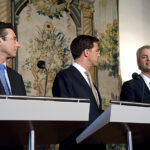Summary: Macron’s “victory” in the recent French elections poses new challenges to a fragmented French Left while leaving France’s innumerable social contradictions unresolved – Editors.
Before dealing with the result of the second and definitive round of the French presidential election it is useful to look to the first round, since the results of the first round demonstrate why Emmanuel Macron ran versus Marine Le Pen. Moreover, it sheds a light on the issues which were at stake and had relevance for the second round.
In the first round, voter participation was around 74%, a turnout that was the lowest percentage in twenty years. A declining turnout can be observed in many countries in Western Europe, brought about by the crisis in politics and the undermining of the constitutional state by the ruling classes in contemporary capitalism.
The failure of a Left election alternative in spite of efforts to mobilize a mass-movement
In the first round President Macron got 28%, Le Pen 23% and Jean-Luc Mélenchon 22% of the votes. The rule in France is that when none of the candidates get more than 50% in the first round, there will be a second round for the two who with the most votes. That is why the second round resulted in Macron, a rightwing politician and a representative of French monopoly capital and financial institutions versus Le Pen, also right-wing, reactionary and strongly xenophobic. With these two candidates the people in France had, metaphorically speaking, the choice between pestilence or cholera.
In order to understand how this dilemma of choosing between pestilence and cholera came into existence in France, we have to look at the other candidates in the first round—and especially the failure of a Left alternative to Macron.
While Mélenchon and his party, “La France insoumise” (LFI) (France Unbowed) did get 22% of the votes, the other candidates in the Left spectrum, Yannick Jadot (Green Party) got 4.6% and Fabien Rousell (Communist Party) got 2.8%. It is remarkable is that the once massive Communist Party got only 2.8% and actually has become a party at the margins.
These results, however, make clear that a united Left in France could have been possible and Mélenchon could have been the opponent of Macron in the second round. But unfortunately, the Left in France was (and is) hopelessly fragmented. That the Left has not succeeded in bridging this fragmentation will place a very difficult path before them in the coming elections (the first will be the elections for the parliament in France in two months) and in organizing battles against capitalism. When it comes to developing unity on the Left and creating a substantial alternative to capitalist society, the French Left will do best when to remember the words of the Marxist philosopher Ernst Bloch, in which he voiced Marx’s critical position against the “German Socialists” and Ludwig Feuerbach in his book The Principle of Hope: “So at least an interaction (Zusammenwirken) between feeling, conscience and above all knowledge belongs to socialist consciousness in order that we can transcend our societal being as it has been until now.”
It will be clear however that as we talk about a “substantial alternative”—and that is exactly the meaning of the words of Bloch, a meaning which we also more or less can conceive of as “a movement from practice to theory”—this includes much more than an alternative on the level of elections.1 But the creation of a Left alternative on the electoral level could be a first step in the direction of a substantial alternative for France.
During the first five years of the Macron presidency there were many militant actions against his politics; above all, the struggles of the Yellow Vests are fresh in our memory. Important issues in the struggles of the Yellow Vests were the direct economic interests of working-class people, such as demands for decent housing and a wage. But as Kevin Anderson writes, “The precipitating grievance of the Yellow Vest movement was a planned hike in the gasoline tax for 2019, which would have hit especially hard the working poor and lower middle classes outside the major urban centers. These sectors of the population are increasingly dependent upon their automobiles to get to work and accomplish other life activities in an economy that is growing more and more delocalized.”2
Anderson characterized the Yellow Vest movement as on the one side a-self-mobilized-mass-movement-with-insurrectionist-overtones and on the other side a movement with “demands …about sending back rejected asylees and about becoming ‘French,’ each of which have some racist overtones.” And he adds that “This is hardly surprising in a country that gave neofascist Marine Le Pen 34% of the vote in the 2017 national elections, with even higher levels in many rural areas.” He concludes with a reference to Cedric Durand that “In this movement one finds cohabiting, amid great confusion, sentiments from the left and sentiments from the right, a large mass of people with little political experience, with anticapitalist activists and fascists.”
The aspect of racism and in general xenophobia was and is grist to the mill of Le Pen and Eric Zemmour— a more rightwing and xenophobic person than Le Pen, who got 8% of the votes in the first round—because they are acting as if the problems in French capitalist society have been and are brought about by “non-French elements” instead of by its contradictory structure. Le Pen with her party Rassamblement Nationale (RN) and Zemmour with his party Reconquête (R), fulfill in this sense the legitimation of capitalism in France and that is exactly their function for the French bourgeoisie.
Beside the struggle of the Yellow Vests there were and are a lot of other battlefields in France. We saw important and hopeful initiatives to combat racism and xenophobia, struggles for better healthcare, especially during the Covid pandemic, the struggle for a good environment, the struggle against the French imperialist adventures in Africa, in particular in Mali, the struggle for women’s liberation and against femicide and the struggle for good education. Although the Covid pandemic did tamp down the fire of these struggles, it did of course not take away their causes.
Election issues of Rassemblement Nationale, Reconquête and La France insoumise
Let us now see in more concrete terms what the election issues of the RN of Le Pen, the LFI of Mélenchon, and Zemmour were.
The RN describes itself as “patriotic” and “national” in the sense of “French identity, tradition and sovereignty.” A central concept for them is the “préférence national,” according to the motto “Les Français d’abord” (the French First). Le Pen has been relatively successful in trying to portray in the media her party as opening up to democracy and secularism and turning away from racism and anti-Semitism. She had help in creating this picture from another rightwing candidate, Zemmour. Before becoming a candidate, he was a long-time journalist active in all kinds of rightwing circles. He was made a candidate by Vincent Bolloré, a French billionaire. Bolloré owns the media-conglomerate Vivendi, with the television canals Canal+, C8 and CNews and has the control over radio Europe 1 and the weekly Paris Match. He gave Zemmour the chance to ventilate his views from 2019 to 2021 in “Face à l’Info” on CNews.
As journalist and candidate Zemmour stressed his distinctive features in the rightwing milieu by bringing to the fore the most extremist notions. Here just a few of them: He has an obsession with the “decline” of the French nation and conceives of anti-racism and feminism as products of Western pseudo-elites, portrays the collaborationist Vichy regime in a positive light, sees homosexuality as undermining virility, called the legalization of abortion “collective suicide,” and argued that women were unsuited to positions of political power. Further, he contends that France’s population will be replaced by immigrants, especially from Islamic countries. Moreover, as to the work conditions of working-class people he proposes the retirement age to be raised from 62 to 64, and is here in line with Macron’s vision.
Zemmour’s way of operating and the issues he brought to the presidential election campaign paved the way for Le Pen to concentrate on the issue of economic purchasing power. Above all the Ukraine War made that a focal point in the election campaign: it was central to her demands to lower the price of motor fuel, regulate the price of electricity, and slow the rise of food prices.
Mélenchon presents himself as anti-capitalist and advocates replacing free-market capitalism, which he sees as only bringing chaos, by a kind of ecologically-planned economy. In this context we have to consider his election promises: introduction of an extra week of paid holiday, retirement at 60 years, moving completely to renewable energy and more taxes on higher earners. And if he were president he would lower the price of motor fuel, block the rise in food prices price, and raise the level of the minimum wage.
As to these proposals of the LFI we have to remark that they concern above all the improvement of the economic position of the lower earning people in France. Nobody in the Left will deny the need to improve the economic position of lower-earning people. But we have to bring the conceptual context of these proposals up for discussion. Mélenchon talks about the chaos of the free-market as against his idea of an ecologically planned economy. Is Macron’s politics however determined by a free-market economy? And what really is an ecologically-planned economy?
What Mélenchon does not seem to see is that Macron’s politics is reflecting a despotic form of production in capitalist society which brings about (among other things) movements in the market. In capitalist society that can’t be otherwise. That is why Dunayevskaya writes, “The attempt to control cooperative labor within capitalist confines must of necessity assume a despotic form. Planned despotism arises out of the antagonistic relationship between the workers, on the one hand, and the capitalist and his bureaucracy on the other hand… The opposition is between the nature of the cooperative form of labor and the capitalistic form of value production.”3
The conceptualization of the despotic form of production in capitalist society determines (among other things) movements in the market. Dunayevskaya’s point about the despotic form of plan provides a notion of the determinative role of economics in capitalism which has a reach which goes far beyond the area of economics; it opens up an analysis of all exploitative and oppressed relations in this society with a perspective on changing these alienated relations in human relations. It gives a more substantial basis for societal change through mass activity than a plan with an ecological touch regulated by state intervention. Moreover, it offers a real possibility of surpassing the dilemma which we saw as described above by the Yellow Vests of “cohabiting, amid great confusion, of sentiments from the left and sentiments from the right”—or in other words, fighting at the same time the politics of Macron and the French bourgeoisie and the rightwing populist ideas of Le Pen and Zemmour.
The result of the second round and a perspective for the Left
The figures of the second round tell us that Macron got 58.5% of the votes and Le Pen 41.5%. The degree of voter participation was lower than in the first round, about 72%. Although these figures suggest a clear victory for Macron, we get another picture when we look to them in more detail. Many of Macron’s voters were not for Macron but voted against Le Pen and the 41.5% for Le Pen shows a considerable growth compared to the last presidential election in 2017 where she got 33.9% and Macron 66.1%. In 2017 Macron had the benefit of the doubt against the rightwing and racist Le Pen. We see the decline of support for Macron in 2022 when we look to the absolute figures: in 2017, 20,743,128 voted for Macron and 10,638,475 for Le Pen. In 2022 these figures were 18,779,641 for Macron and 13,297,760 for Le Pen. Moreover, the figure of voter abstention in 2022 was in absolute terms 13,656,109 and blank or invalid 3,018,990.
A remarkable result in the second round is what France 24 reported on April 26: “Overseas territories reject Macron: Voters choose Le Pen after voting Mélenchon in first round. Playing on anger against Paris and Macron as a leader, Le Pen came out easily on top in France’s main Caribbean islands of Guadeloupe and Martinique as well as in French Guyana in South America and the Indian Ocean islands of Reunion and Mayotte.”4
We can record that the position of Macron has become less stable and in a certain sense his victory is actually a pyrrhic victory. There was a lot of commentary by rightwing and liberal politicians and their pundits in Europe referring positively to Macron as pro-European and therefore a “progressive” president. For these politicians and pundits “Europe” is a panacea in the box of tricks in the world of capitalism. Although they did break into shouts of joy with his re-election, they are afraid for a France in which Macron faces challenges in a divided nation after his election.
But capitalistic France was a divided nation beforehand as we know from the social-economic struggles described above. And in trying to respond to this division and to defend and strengthen the power of the French bourgeoisie, Macron came forward during the last five years with a series of proposals and measures. We will consider some of them.
- He called for a “big debate” with people in France with the intention of taking off the pressure of the “Yellow Vests” movement. In this debate hundreds of proposals were brought to the fore by participants, with only a few being accepted. Many people in Europe who consider themselves “progressive” and “democratic” saw this as an example of the way of Macron operates. Actually this “debate” was throwing dust in the eyes of the people. The unions were right that what was needed was a “big debate on the streets” and a nationwide general strike.
- Besides the “organizing of a debate” he was actually working on the extension of the so-called anti-terror law which grants powers to the prefects and special police units to curtail the right to demonstrate. This demonstrates Macron’s reactionary intentions.
- Macron’s closeness to big capital has been shown by Le Monde in the case of the U.S. McKinsey firm: “Yet it remains undeniable that the American firm has been associated with some of the most important projects of Mr. Macron’s five-year term. According to research by Le Monde, McKinsey has carried out at least forty jobs for the government, the presidency or state agencies between 2018 and 2021, at a cost of between 28 and 50 million euros.”5
- One of the most scandalous acts of Macron was his plan to reform the conditions of retirement. Beside a proposal to raise the age of the retirement to 65, he had close contact with the BlackRock investment firm with the goal of directing pension funds to more favorable private interests. According to Le Monde, “A former senior official is indeed the current boss of the French branch of BlackRock, an American financial giant. The group regularly pleads, as it did in a 16-page document published in June, for the establishment of more favorable conditions for funded pension schemes managed by private interests. And Macron met its boss, Larry Fink, at the Elysée Palace on July 10, along with other fund managers.”6
- How Macron thinks about the economic position of working-class people and the interests of the rich becomes clear from how, “At the same time that he raised the gas tax, his ISF tax (Impôt de solidarité sur la fortune) cut for the very wealthy” which meant that “the 100 richest people in the country received the equivalent of a million euros ($1.14 million) each in tax reduction.”7
- Macron has not made any serious effort to reduce racist and xenophobic tendencies in French society, on the contrary he has cut spending on social welfare and education with his hazardous imperialist policy.
Confronted with such a reactionary class enemy as representative of the French bourgeoisie and his European supporters, the Left in France will have to roll up its sleeves and as a first step unify its powers for the coming election for parliament in June.
1.See for the notion “from practice to theory’: “Part One: Not by Practice Alone: The Movement from Theory” in The Marxist-Humanist Theory of State-Capitalism: Selected writings by Raya Dunayevskaya, pp. 3- 14
2.https://imhojournal.org/articles/the-french-yellow-vests-a-self-mobilized-mass-movement-with-insurrectionist-overtones/
3. Raya Dunayevskaya, Marxism and Freedom, pp. 92, 93
4. https://www.france24.com/en/france/20220426-france-s-macron-faces-challenges-in-a-divided-nation-after-election-win
5. https://www.lemonde.fr/en/les-decodeurs/article/2022/03/30/mckinsey-and-macron-what-s-real-and-what-s-fake-about-this controversy_5979414_8.html?h=https://ad.atdmt.com/s/go;adv=11307209371838;ec=11307209372418;c.a=16972925913;s.a=google;p.a=16972925913;as.a=142578398144;qpb=1;?bidkw=defaultkeyword&gclid=EAIaIQobChMI6J6p4fm59wIVm4ODBx3KHA2dEAAYASAAEgKL4vD_BwE
6. https://www.lemonde.fr/les-decodeurs/article/2020/01/02/la-reforme-des-retraites-ouvre-t-elle-la-voie-a-blackrock-et-aux-fonds-prives_6024634_4355770.html
7. See note 2





0 Comments